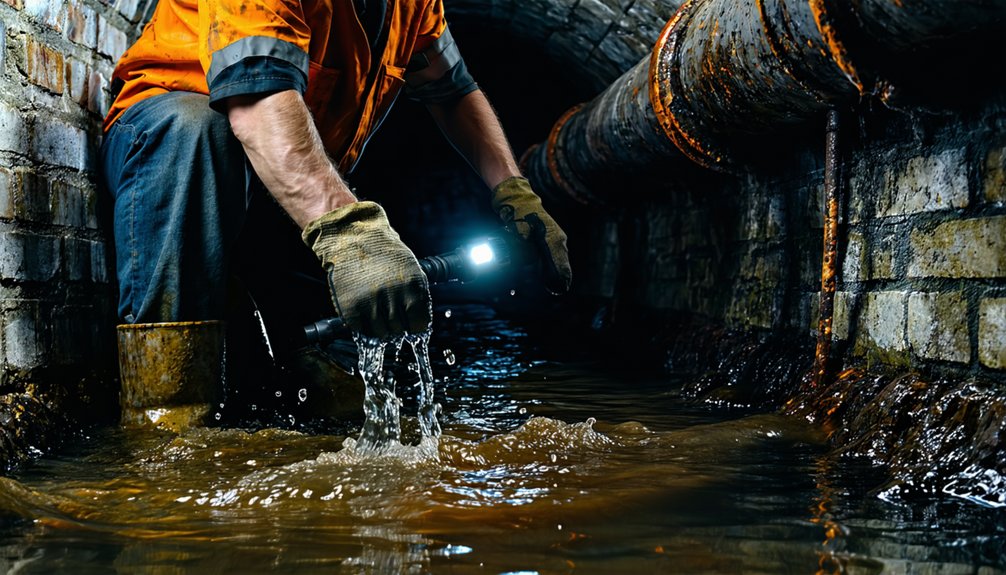When selecting sewer line repair services, it is crucial to ask five key questions. Inquire about the company's experience, including years in business and references. Confirm the range of services offered to guarantee both minor and major issues can be addressed. Understand the technologies and methods utilized for repairs, as well as seek a detailed estimate outlining costs and timelines. Finally, ascertain if a warranty is provided on services, indicating reliability. Discover further insights on these critical considerations.
What Is Your Experience With Sewer Line Repair?
When evaluating a sewer line repair service, one essential consideration is the company's experience in the field. A plumbing company with substantial experience in sewer line repair not only demonstrates reliability but also showcases their problem-solving skills in addressing various sewer line issues. Inquiring about the number of years they have operated specifically in this domain can provide insight into their expertise. Additionally, potential clients should request references from recent projects to assess the quality of work and customer satisfaction levels.
It is vital to verify that technicians possess specialized training and certifications in sewer line repair techniques, ensuring they are well-versed in contemporary methods. Moreover, experience with diverse pipe materials, such as clay, cast iron, and modern plastics, can greatly impact repair strategies. Gathering this information allows homeowners to make informed decisions, ultimately leading to a successful sewer line repair experience.
Do You Offer Comprehensive Sewer Repair Services?
How essential is it for homeowners to find a sewer repair service that offers extensive solutions? Thorough sewer repair services are vital for maintaining the health and functionality of sewer systems. Homeowners should seek providers that deliver a full spectrum of repair options, ensuring both minor fixes and major replacements can be addressed without the need for multiple contractors.
Finding a comprehensive sewer repair service is crucial for homeowners to ensure efficient system maintenance and avoid multiple contractor hassles.
Consider these key aspects:
- Experience with Various Pipe Materials: Ensuring the service is experienced in handling modern plastic pipes and older clay or cast iron systems.
- Utilization of Advanced Technologies: Employing video inspections for accurate diagnosis of sewer line conditions.
- Preventive Maintenance Options: Offering strategies to minimize future issues and enhance long-term system efficiency.
A reliable plumbing service should also be equipped to handle emergency repairs, providing a thorough approach to sewer line challenges.
What Technologies and Methods Do You Use?
What technologies and methods are employed in modern sewer line repair services greatly influence the effectiveness and efficiency of the repair process. Professional plumbers utilize trenchless technology, which minimizes excavation and reduces disruption to properties, allowing for quicker repairs. Hydro jetting is another prevalent method, employing high-pressure water jets to eliminate stubborn blockages and debris, ensuring thorough cleaning without harming the pipes. Video inspection technology plays an essential role as well, enabling real-time assessment of sewer conditions, identifying cracks and root intrusions without invasive procedures. Additionally, snaking is an effective technique for smaller blockages, where a flexible auger is used to break up clogs. The selection of these modern methods and technologies considerably affects both the cost and effectiveness of sewer line repairs, underscoring the importance of a professional plumber's expertise in sewer to achieve ideal results.
Can You Provide a Detailed Estimate and Timeline?
Understanding the specifics of a detailed estimate and timeline is essential for homeowners seeking sewer line repair services. A thorough estimate should include a breakdown of all costs associated with the project, providing clarity on labor, materials, and any potential additional fees.
Key components to evaluate in a detailed estimate and timeline include:
- Scope of Work: A clear outline of specific tasks involved in the repair process.
- Timeline for Project Completion: A defined schedule to manage expectations and minimize property disruption.
- Communication on Unexpected Delays: Transparency about factors that could alter pricing or extend the timeline.
Additionally, ensuring the estimate includes warranties can enhance peace of mind regarding the quality of service. Homeowners are encouraged to seek clarity on these aspects to make informed decisions about their sewer line repair needs.
Do You Offer a Warranty on Your Repairs?
A warranty on repairs serves as a significant indicator of a sewer line repair service's reliability and confidence in their workmanship. Homeowners should seek a reputable service provider that offers at least a one-year full warranty on repairs, as this reflects a commitment to quality of service. Such a warranty provides peace of mind, ensuring that any issues arising shortly after the repair will be addressed without incurring additional costs. It is essential for homeowners to clarify the warranty's coverage, including specifics on parts, labor, and types of repairs included. A lack of warranty may suggest inferior materials or workmanship, potentially leading to frequent issues and higher long-term expenses. Understanding warranty terms upfront enables homeowners to make informed decisions, safeguarding against future disputes regarding repair responsibilities and enhancing the overall experience with their chosen service provider.
Frequently Asked Questions
What's the Average Cost to Replace a Sewer Line?
The average cost to replace a sewer line can range considerably, with traditional methods averaging between $7,000 and $25,000, while trenchless technology offers a more affordable option at approximately $200 per foot. Factors affecting these costs include the depth of existing lines and site accessibility. Homeowners should also consider financing options and be aware of warning signs, such as root infiltration, to determine whether to pursue DIY repairs or professional services.
How Long Does It Take to Fix a Main Sewer Line?
Repair timeframes for main sewer lines vary greatly based on factors such as digging methods and pipe materials. Minor repairs may require 4 to 8 hours, while complex blockages can extend repair time to several days. Inspection techniques and maintenance tips can help identify blockage causes early. Additionally, understanding contractor qualifications and available service warranties guarantees informed decisions. Emergency services and preventive measures further mitigate potential delays in the future.
Does Insurance Cover Broken Sewer Line?
The question of whether insurance covers a broken sewer line hinges on specific policy limitations. Many home insurance policies exclude coverage for sewer line repairs unless the damage results from a covered event, such as a sudden incident. Homeowners should be aware of coverage exclusions and consider optional sewer backup coverage to mitigate repair costs. Documenting damage and consulting with an insurance agent is essential when filing claims related to plumbing issues and broken pipes.
Are Local Governments Responsible for Paying for Sewer Line Repairs?
Local governments often navigate a complex landscape of public responsibility and local regulations concerning sewer line repairs. While they typically oversee main infrastructure management, the burden of repair policies usually falls on homeowners for connections to these lines. Funding sources such as maintenance programs may exist, offering assistance. However, taxpayer implications arise when considering the balance between service agreements and emergency protocols, affecting community impact and individual financial obligations during sewer line emergencies.


